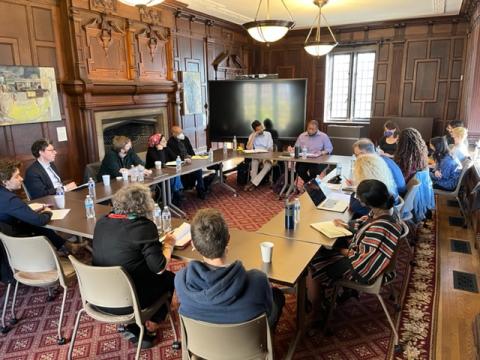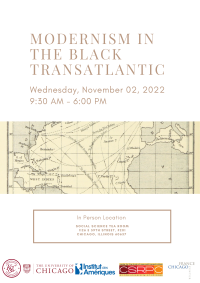

The day of conference entitled “Modernism in the Black Transatlantic” was held on the 2nd of November 2022 at the Social Science Tea Room of the University of Chicago. The event was organized by Adam Bigache, coordinator of the Chicago Hub of the Institut des Amériques, in collaboration with the FFrance Chicago Center of the University of Chicago and was sponsored by the Karla Scherer Center and the Center for the Study of Race, Politics and Culture.

The day of conference was structured around four panels and one keynote address at the end. Each presentation was followed by half an hour of exchanges with the other participants and the audience and each focused on different aspects of the development of a transatlantic black modernism, exploring for instance networks of literary or political influences, as well as routes and structures that allowed for those exchanges to take place across continents.
The day opened on introductory words from Eric Slauter, dean of the Humanities at UChicago and director of the Karla Scherer Center and Hélène Aji, vice president of the Institut des Amériques and professor at the Ecole Normale Supérieure (ENS-Ulm).
The first panel focused on the work of Korey Williams, doctoral student at the Department of English Language and Literature, of Arwa Awan, PhD candidate in Political Science at the University of Chicago, and of Frédéric Sylvanise, professor at the Université Paris Cité.
Entitled ‘Ever Wished You Were Queer?’ Erotic Malaise and the Promise of Ruin (Richard Nugent, James Baldwin and Isaac Julien), Korey Williams’ presentation traced the legacy and influence of Richard Bruce Nugent’s queer modernist short story “Smoke, Lilies and Jade” on Another Country by James Baldwin and Looking for Langston by Isaac Julien. In doing so, Williams highlighted the transatlantic lineage of queer black esthetes, theorizing the notion of erotic malaise as a way to consider the potential of love in the emergence of a more just world.
Arwa Awan’s presentation, Aimé Césaire’s ’Tropical Marxism’ and the Problem of Alienation sought to retrace the intellectual roots of Césaire’s conception of tropical Marxism. To do so, Awan focused on Césaire’s analysis of alienation in two pieces written in the 1930s: “Black Youth and Assimilation, published in the first issue of student magazine L’étudiant noir, and his essay entitled “Racial Consciousness and Social Revolution”. Her close reading of those two essays allowed Awan to define Césaire’s concept of alienation and to trace its roots in Marxist theory, in conversation with Hegelian philosopher Alexander Krojève and the French Marxist group La Philosophie. Awan’s detailed focus on those networks of intellectual influences offered an in-depth look at Césaire’s analysis of the effects of colonization and assimilation across the Atlantic.
Frédéric Sylvanise’s presentation, The Modernist Poetry of Robert Hayden and its Influence on Subsequent Generations of African American Poets, explored the legacy of black modernist poet Robert Hayden, as well as the way his writing participated in a literary conversation regarding black aesthetics and history. Sylvanise focused on Hayden’s 1960s career, as the poet disowned his previous collections, judged too didactic and transparent in their political approach. Through a close analysis of Hayden’s poem “Middle Passage”, Sylvanise situated Hayden’s work in relationship with Western literary tradition, from which he broke away to celebrate the advent of a black aesthetic.
The second panel included presentations by Niklas Plaetzer, PhD student in the Department of Political Science and Laurence Cossu-Beaumont, professor at the Université Sorbonne Nouvelle in Paris.
Entitled Plebeian Internationalism against "Racial Democracy": Antonio Pedro de Figueiredo, despite Gilberto Freyre, Niklas Plaetzer’s presentation focused on an analysis of Brazilian socialist and journalist Antonio Pedro de Figueiredo’s republican critique or racial domination in 1840s. Mostly known through the writings of Gilberto Freyre, Figueiredo’s legacy was, as Plaetzer argued, instrumentalized in service of the ideology of racial democracy, and its use in the deployment of Brazilian nationalism. Away from this distorted vision of Figueiredo’s work, Plaetzer returned to the source material in order to highlight Figueiredo’s unique political thought and contribution to a plebeian internationalism in a global socialist movement of the 1840s.
Laurence Cossu-Beaumont’s presentation, Paris Noir : A Reflection on Routes, Encounters and Networks in the Black Atlantic used the prism of cultural and book history to analyze the cultural circulation and transfers that allowed for the development of a Black Atlantic. She first focused on places and vehicles that became hubs of those exchanges, highlighting the role of Paris as an intellectual meeting place, as well as French magazines and their commitment to a Transnational ethos. In doing so, Cossu-Beaumont analyzed the role of the dynamics of sociability in the making of those transnational networks: salons, often led by women such as the Nardal sisters, and focused on the role of literary agents, whose transatlantic connections allowed for the circulation of books across continents.
The third panel included presentations by Uday Jain, PhD candidate in the Division of Social Science and Noah Hansen, who received his PhD in English Language and Literature in 2022.
Uday Jain’s presentation, entitled The Question of Respect: Du Bois in Versailles 1919, Ambedkar in London 1930-1932 focused on the way political leaders in America and India used international diplomatic conferences to challenge global colonial hierarchies as well as international social hierarchies within their own nations. Jain’s analysis of Du Bois’s and Ambedkar’s participations in those conferences allowed him to describe a network of transnational solidarity between populations surviving against state mandated social and economic violence, drawing a sharp focus on the relationship between African American struggle for emancipation and Ambedkar’s project of the construction of a free Indian state that would allow for the end of an oppressive caste system.
Noah Hansen’s presentation, Anthologizing the Diaspora: K.R. Ralph Casimir, the Global New Negro Movement, The Book of Negro Poems and Songs: 1919 focused on an unpublished collection of poetry produced by Garveyite activist J.R. Ralph Casimir in Dominica. Opening on Casimir’s history of political work for the Garveyite U.N.I.A. in Dominica, Hansen offered an analysis of the anthology’s contents, focusing on the variety of poetic forms and voices it contains. Hansen’s focus on a collection characterized by its periphery from canonical Black literature of the early twentieth century allowed him to expand the borders of the New Negro movement, as well as consider a broader network of exchanges at play in a global Black literature.
The day of conference concluded on a keynote speech delivered by Kenneth Warren, Fairfax M. Cone Distinguished Service Professor at the University of Chicago.
Entitled A Common Disaster and One Long Memory: William Gardner Smith’s The Stone Face and the Problem of Solidarity, Kenneth Warren’s speech focused on the 1963 novel and its depiction of the October 1961 bloody repression of Algerian protestors in the streets of Paris. Seen through the eye of Simeon Brown, an African American expatriate who fled the violence of Jim Crow America, the deadly oppression of Algerians in Paris becomes a way for the novel to problematize the issue of solidarity between those victimized by state powers. Kenneth Warren’s close analysis of the novel he described as the chronicle of political and moral growth and redemption of its African-American protagonist
explored Smith’s effort to establish grounds for a transnational solidarity that would exceed the limitations of prejudices.

